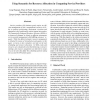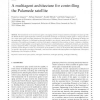132 search results - page 21 / 27 » Autonomous Scheduling |
134
Voted
CP
2009
Springer
15 years 9 months ago
2009
Springer
Abstract. The global cumulative constraint was proposed for modelling cumulative resources in scheduling problems for finite domain (FD) propagation. Since that time a great deal ...
119
click to vote
IEEESCC
2008
IEEE
15 years 9 months ago
2008
IEEE
Service providers (SP) business goals require an efficient management of their computational resources in order to perform provisioning, deployment, execution and adaptation whic...
109
click to vote
WIAS
2010
15 years 25 days ago
2010
The fundamental role of autonomous agents in managing activities of space systems has emerged some years ago with the NASA’s Remote Agent Experiment. However, the possible advant...
138
click to vote
ICAC
2008
IEEE
15 years 9 months ago
2008
IEEE
—Large scale production grids are an important case for autonomic computing. They follow a mutualization paradigm: decision-making (human or automatic) is distributed and largely...
109
Voted
IROS
2008
IEEE
15 years 9 months ago
2008
IEEE
— A hormone-inspired task scheduling method is described which assigns tasks to a group of robots, taking into account the robots’ performances. This method draws on previous w...


